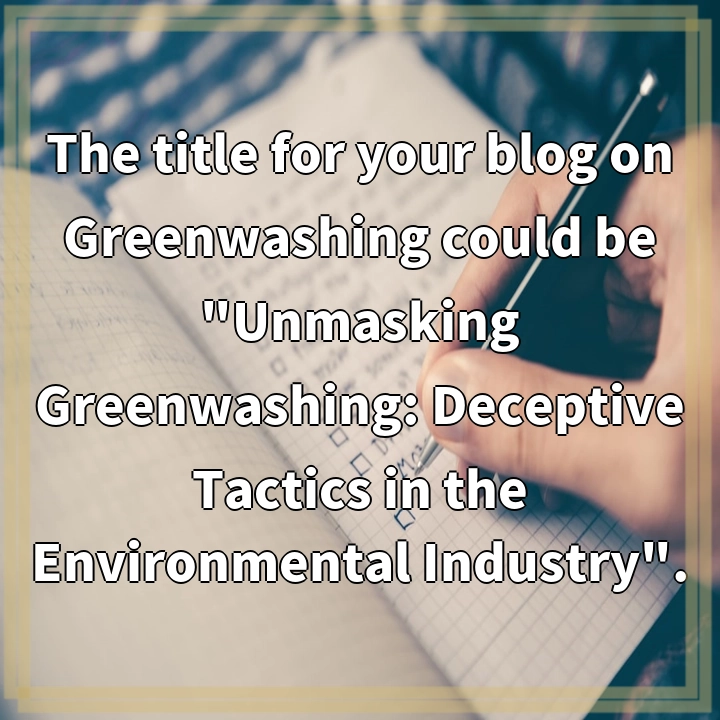
What is Greenwashing?
Greenwashing refers to the practice of presenting a false or misleading image of environmental responsibility by companies or organizations. It involves making exaggerated or unsubstantiated claims about products, services, or practices to appear more environmentally friendly than they actually are.
Real-World Problems Associated with Greenwashing
Greenwashing poses several significant challenges and consequences in the environmental landscape:
1. Misleading Consumers
One of the main problems with greenwashing is that it can deceive and mislead consumers. When companies falsely claim to be environmentally friendly or sustainable, it becomes difficult for consumers to make informed choices. This can hinder progress towards a more sustainable future as consumers may unwittingly support companies that engage in harmful practices.
2. Undermining Genuine Environmental Efforts
Greenwashing can undermine the efforts of genuinely environmentally conscious businesses and organizations. When companies use deceptive tactics, it casts doubt on the credibility of all environmental claims, making it harder for those who are genuinely working towards sustainability to gain recognition and support.
3. Lack of Accountability
Greenwashing allows companies to avoid taking genuine responsibility for their environmental impact. By creating a false image of sustainability, companies can deflect attention from their actual ecological practices and avoid making necessary changes to minimize negative impacts. This lack of accountability can lead to the continued degradation of the environment.
4. Stifling Innovation
When companies engage in greenwashing, it can discourage true innovation in sustainable practices. By creating the illusion of being environmentally friendly without making substantial changes, companies may believe they can simply rely on marketing tactics instead of investing in research and development of genuinely sustainable solutions.
5. Negative Impact on Reputation
If a company is exposed for greenwashing, it can result in significant damage to its reputation. Consumers are increasingly demanding transparency and accountability from businesses, and if a company’s claims are exposed as false, it can lead to public backlash, loss of trust, and ultimately, financial repercussions.
Conclusion
Greenwashing is a pervasive problem that hinders genuine environmental progress. Through deceptive tactics, companies attempt to appear environmentally responsible while continuing unsustainable practices. Understanding the issues associated with greenwashing is crucial in order to make informed choices and support businesses and organizations that genuinely prioritize sustainability.

Solutions to Greenwashing
Addressing the issue of greenwashing requires collective efforts from various stakeholders. Here are some solutions to combat greenwashing:
1. Consumer Education and Awareness
Educating consumers about greenwashing tactics and providing them with the necessary tools to identify genuine environmentally responsible practices can empower them to make informed choices. This includes promoting media literacy, encouraging research, and supporting independent certifications and labels.
2. Strengthening Regulations
Governments and regulatory bodies can play a crucial role in combating greenwashing. Implementing stringent regulations and standards for environmental claims can ensure that companies are held accountable for their claims. This may involve clearer guidelines for labeling, increased transparency in reporting, and hefty penalties for misleading advertising.
3. Independent Verification and Certification
Encouraging the use of independent third-party verification and certification can help build trust and credibility. Recognized certifications from reputable organizations can provide consumers with assurance that a product or service meets specific environmental standards. Supporting and promoting these certification programs can incentivize companies to engage in genuine sustainability efforts.
4. Transparent Reporting
Companies should adopt transparent reporting practices regarding their environmental impact. This includes disclosing data on resource usage, emissions, waste management, and efforts to mitigate negative impacts. Transparent reporting fosters accountability, builds trust, and enables consumers to make informed decisions.
5. Collaboration and Partnerships
Collaboration between businesses, nonprofits, government agencies, and other stakeholders is essential in addressing greenwashing. By working together, sharing best practices, and engaging in collective efforts, the fight against greenwashing can be more effective. Partnerships can also provide resources and support for genuine environmental initiatives.
Conclusion
Combating greenwashing requires a combination of consumer education, strong regulations, independent verification, transparency, and collaboration. By implementing these solutions, we can promote genuine sustainability efforts and hold companies accountable for their environmental claims. Together, we can create a more sustainable and transparent future.















